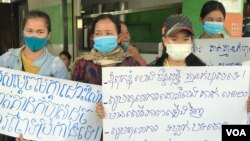The families of former activists and members of the disbanded opposition party, who have been jailed this year, petitioned the U.S. Embassy in Phnom Penh on Friday to intervene and aid in the release of their relatives.
The government has arrested former Cambodia National Rescue Party provincial officials and activists this year, often on the pretext of curbing the spread of fake news. Human Rights Watch has documented the arrest of at least 30 opposition officials, 16 of whom have been charged with varying crimes, such as incitement, conspiracy, and inciting military personnel to be disobedient.
The June 26 petition, delivered to the U.S. Embassy in Phnom Penh on Friday, states that the former CNRP members had been jailed and sent to the notorious Prey Sar prison in the capital. The CNRP members had not committed any crimes, the families said in the petition.
“They didn’t commit anything wrong against the local and international laws,” read the petition. “After the arrest, our families are in a very difficult living condition.”
The families of the jailed CNRP members said they were facing economic and mental stress following the arrest and wanted their loved ones to be released from prison.
Sam Chenda, 51, said her husband Keo Thay, who was the former Kampong Chhnang provincial CNRP party head, was arrested without a warrant and the family was given no clear reason for his incarceration.
“The arrest of my husband is very unfair and politically motivated. They intended to arrest him since 2019,” she claimed.
Sun Thun, a former Cambodia National Rescue Party district councilor, was arrested from his home in early June in Kampong Thom province’s Taing Kouk district. Again, his family said there was no clear reason given for the arrest, with his son Thun Theany linking it to Sun Thun’s political activism in the province.
“He was an active politician at the local level. The authorities of the ruling party were not pleased with him and they wanted to shut his mouth and restrict our freedoms,” he said.
The arrests of former CNRP activists and members this year mirrors similar arrests in 2019 when around 70 party members were arrested for allegedly aiding in opposition leader Sam Rainsy’s return to Cambodia in November. The planned return was eventually blocked by the Cambodian government and the 74 CNRP members released.
Arend Zwartjes, a spokesperson for the U.S. Embassy, said the diplomatic mission had received the petition requesting assistance to secure the release of jailed CNRP members, but could not comment on the embassy’s next course of action.
“We do not support any particular political group or individual, but rather support the Cambodian people’s constitutional right to democracy and fundamental freedoms,” he said.
“We are deeply concerned by the recent series of arrests, harassment, and intimidation of the political opposition by the Cambodian government. We call on all parties to conduct a peaceful, meaningful process of dialogue and national reconciliation.”
Sam Sokong, the lawyer for a majority of the jailed activists, said they have been charged with varying crimes, such as incitement, conspiracy, and inciting military personnel to be disobedient. He added that they were also questioned about their social media activity on Facebook.
“I don’t think it is like the alleged offense of plotting,” he said. “They just used their right to freedom of expression.”
Chin Malin, a Justice Ministry spokesperson and deputy head of the Cambodian Human Rights Committee, said the families had a right to seek the U.S.’s intervention but it would not work.
“Based on legal principles, no one or no institution can intervene and violate Cambodian laws, “he said. “There was enough evidence [to arrest them].”
Following an impressive showing in the 2017 commune election, then-CNRP President Kem Sokha was arrested on treason charges and the party disbanded by a November 2017 Supreme Court ruling, based on the government’s so-called color revolution narrative.
More than 5,000 local level CNRP officials were stripped of their elected positions after the Supreme Court verdict, many leaving the country fearing intimidation, harassment, and arrest.




